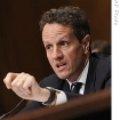Obama Administration Defends Budget, Economic Plans
Appearing before two committees in the House of Representatives, Orszag and Geithner called President Obama's budget an honest and candid depiction of where the U.S. economy stands and what must be done to start repairing it.
Saying the United States has no choice but to change course from past policies, Orszag told the House Budget Committee that the White House proposal is a starting point for reorienting the nation's long-term economic efficiency and productivity. "We have lived through an era of irresponsibility in which we have failed to address deep problems in energy, education and health care, and in which the primary theory of the case was that the only determinant of economic performance was the marginal tax rate on the wealthy and that the way to promote market competition was to channel significant subsidies to corporations," he said. Orszag said President Obama inherited a pair of trillion dollar deficits - one being the difference between current U.S. economic output and what the country could be producing, the other being the amount of deficit spending he says is needed now for recovery.
Contrary to what critics assert, Orszag said, the proposed budget is not just a big spending plan that comes in the wake of a $787 billion stimulus bill Congress approved. He said that the government faces the combined pressures of a weak economy driving down revenue and the need to spend hundreds of billions of dollars to stabilize financial markets.
"All in, the budget includes $2.7 trillion in costs over the next decade that would have been excluded from previous [Bush administration] budgets. That sets a high bar [goal], but it is an honest bar," he said. Republicans such as Representative Paul Ryan repeated their assertions that President Obama is trying to force through a huge and costly expansion of government. "This is not changing the tone of Washington or forging a compromise. This is staking out an ideological conquest," he said. House Budget Committee Chairman, Democrat John Spratt said that facing the stark economic realities left by the Bush administration, President Obama is trying to address important needs while aiming to bring shrink the deficit in coming years.
"[The budget] takes on topics indeed that have been ignored by earlier budgets as too tough to tackle: climate change, health care for the 46 million [Americans] who are uninsured," he said. In separate testimony to the House Ways and Means Committee, Treasury Secretary Timothy Geithner said there is no alternative to forceful action to slow the recession and get credit moving again, including steps to strengthen the banking system.
"Part of that requires that we make sure banks are strong enough, that they can provide credit. And that is what our plan is going to do, and we will do that with the necessary force and speed because again, the alternative is to live with a situation where the financial system continues to be more defensive over time and that will leave businesses and families without the credit they need to do what they want to do," he said. Geithner said he shares concerns of lawmakers that the stock market has not reacted positively to actions taken so far by the Obama administration.
Responding to Republican criticisms, Geithner said there is no alternative to restoring confidence in the U.S. financial system at home and abroad. "The alternative path for us, which is to sit back [and] hope that this crisis burns itself out, would mean a much deeper recession with much greater damage to American businesses and families, with much greater physical damage to our economy, leaving us with much greater deficits in the future. And the judgment we are making, and it is absolutely the right judgment, is that as a country, given where we started, we have no choice but to move aggressively on these fronts," he said. In remarks at the U.S. Transportation Department, President Obama said America's economic performance in the first quarter of this year is not likely to improve over the dismal results in the closing months of last year. And the president again identified the weak credit environment as one of the main challenges facing the economy. "We have to jump-start the credit markets and get private lending going again," he said. Also testifying on Capitol Hill on Tuesday was Federal Reserve Chairman Ben Bernanke, who told the Senate Banking Committee that President Obama's $787 billion government spending and tax cut plan should help the economy. Bernanke also said that the overall impact of the American Recovery and Reinvestment Act remains subject to "considerable uncertainty," adding that real recovery depends on the government's ability to stabilize financial markets. By Dan Robinson Washington 03 March 2009

